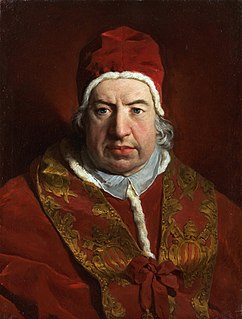A Quote by Pope Benedict XIV
The first consideration is that the ceremonies of the Mosaic Law were abrogated by the coming of Christ and that they can no longer be observed without sin after the promulgation of the Gospel.
Related Quotes
How so? Briefly, apart from the gospel and outside of Christ, the law is my enemy and condemns me. Why? Because God is my enemy and condemns me. But with the gospel and in Christ, united to him by faith, the law is no longer my enemy but my friend. Why? Because now God is no longer my enemy but my friend, and the law, his will—the law in its moral core, as reflective of his character and of concerns eternally inherent in his own person and so of what pleases him—is now my friendly guide for life in fellowship with God.
The Old Testament records the preparation for the coming of the Messiah. The Gospels record the coming of the Messiah, Jesus Christ our Lord. The book of Acts records the propagation of the gospel (the good news) concerning Jesus Christ. The Epistles (letters) explain the gospel and its implications for our lives. The book of Revelation anticipates and describes the second coming of Jesus Christ and the establishment of His eternal kingdom. From beginning to end, the Bible glorifies Jesus Christ and centers on Him. Its Christ-centeredness is one of its wonderful features.
There are actually only ever two pastoral problems you will ever encounter. The first is this: persuading those who are under the dominion of sin that they are under the dominion of sin. That's the task of evangelism. And [second], persuading those who are no longer under the dominion of sin that they are no longer under the dominion of sin because they're Christ's.
Father God, thank You for having no condemnation for those who are in Christ Jesus, because through Christ Jesus the law of the Spirit of life set me free from the law of sin and death. For what the law was powerless to do in that it was weakened by the sinful nature, You did by sending Your own Son in the likeness of sinful man to be a sin offering. (Rom. 8:1-3) Help me to understand that the loving chastisement that might come to me after I have rebelled against You is only in the purest Father's love and is never to be confused with condemnation. (Heb. 12:6)
The Gospel is temporary, but the law is eternal and is restored precisely through the Gospel. Freedom from the law consists, then, not in the fact that the Christian has nothing more to do with the law, but lies in the fact that the law demands nothing more from the Christian as a condition of salvation. The law can no longer judge and condemn him. Instead he delights in the law of God according to the inner man and yearns for it day and night.
The gospel is saying that, what man cannot do in order to be accepted with God, this God Himself has done for us in the person of Jesus Christ. To be acceptable to God we must present to God a life of perfect and unceasing obedience to his will. The gospel declares that Jesus has done this for us. For God to be righteous he must deal with our sin. This also he has done for us in Jesus. The holy law of God was lived out perfectly for us by Christ, and its penalty was paid perfectly for us by Christ. The living and dying of Christ for us, and this alone is the basis of our acceptance with God































